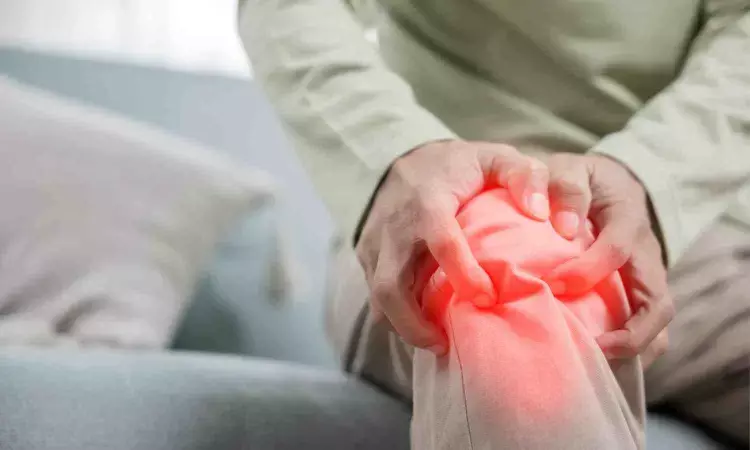- Home
- Medical news & Guidelines
- Anesthesiology
- Cardiology and CTVS
- Critical Care
- Dentistry
- Dermatology
- Diabetes and Endocrinology
- ENT
- Gastroenterology
- Medicine
- Nephrology
- Neurology
- Obstretics-Gynaecology
- Oncology
- Ophthalmology
- Orthopaedics
- Pediatrics-Neonatology
- Psychiatry
- Pulmonology
- Radiology
- Surgery
- Urology
- Laboratory Medicine
- Diet
- Nursing
- Paramedical
- Physiotherapy
- Health news
- Fact Check
- Bone Health Fact Check
- Brain Health Fact Check
- Cancer Related Fact Check
- Child Care Fact Check
- Dental and oral health fact check
- Diabetes and metabolic health fact check
- Diet and Nutrition Fact Check
- Eye and ENT Care Fact Check
- Fitness fact check
- Gut health fact check
- Heart health fact check
- Kidney health fact check
- Medical education fact check
- Men's health fact check
- Respiratory fact check
- Skin and hair care fact check
- Vaccine and Immunization fact check
- Women's health fact check
- AYUSH
- State News
- Andaman and Nicobar Islands
- Andhra Pradesh
- Arunachal Pradesh
- Assam
- Bihar
- Chandigarh
- Chattisgarh
- Dadra and Nagar Haveli
- Daman and Diu
- Delhi
- Goa
- Gujarat
- Haryana
- Himachal Pradesh
- Jammu & Kashmir
- Jharkhand
- Karnataka
- Kerala
- Ladakh
- Lakshadweep
- Madhya Pradesh
- Maharashtra
- Manipur
- Meghalaya
- Mizoram
- Nagaland
- Odisha
- Puducherry
- Punjab
- Rajasthan
- Sikkim
- Tamil Nadu
- Telangana
- Tripura
- Uttar Pradesh
- Uttrakhand
- West Bengal
- Medical Education
- Industry
Study Finds U-Shaped Link Between TyG-BMI and Mortality Risks in Osteoarthritis Patients, Highlighting IR Role

China: A recent analysis of National Health and Nutrition Examination Survey (NHANES) data from 1999 to 2020 has unveiled a U-shaped nonlinear relationship between the triglyceride glucose-body mass index (TyG-BMI) and both all-cause and cardiovascular mortality among adults with osteoarthritis (OA) in the United States.
The findings, published in Scientific Reports, highlight the complex role that insulin resistance (IR) plays in the health outcomes of these patients.
"Mortality risks escalated when TyG-BMI levels exceeded thresholds of 282 for all-cause mortality and 270 for cardiovascular mortality. For each 10-unit increase above these thresholds, there was a corresponding 3% rise in the risk of all-cause mortality and a 5% increase in cardiovascular mortality risk," the researchers reported.
The TyG-BMI index, a composite measure combining triglyceride levels, glucose levels, and body mass index, has been increasingly recognized for its potential in assessing metabolic health and the risk of adverse outcomes. The relationship between insulin resistance and all-cause and cardiovascular mortality risk in osteoarthritis patients is still unclear. Considering this, Wenbo Ding, China Medical University, Liaoning, People’s Republic of China, and colleagues aimed to clarify the correlation between a novel marker of IR, the TyG-BMI index, and the risk of all-cause mortality and cardiovascular mortality in OA patients.
For this purpose, the researchers analyzed data from the NHANES covering 1999 to 2020. They used multivariable Cox proportional hazards regression analysis and restricted cubic spline plots to investigate the relationship between the TyG-BMI index and all-cause and cardiovascular mortality risk among osteoarthritis patients. To further refine their findings, subgroup analyses were performed to examine potential interactions and identify populations at higher mortality risk.
The study included a cohort of 4,097 OA patients who were followed for 20 years, during which 1,197 cases of all-cause mortality and 329 cases of cardiovascular mortality were documented.
The following were the key findings of the study:
- There was a U-shaped nonlinear relationship between the TyG-BMI index and the risk of all-cause mortality or cardiovascular mortality in OA patients, with the lowest mortality risk thresholds identified at 282 and 270, respectively.
- Surpassing these thresholds was associated with a 3% increase in the risk of all-cause mortality and a 5% increase in the risk of cardiovascular mortality for every 10-unit increment in TyG-BMI level.
The study reveals a U-shaped nonlinear relationship between TyG-BMI levels and all-cause and cardiovascular mortality in osteoarthritis (OA) patients, identifying a specific TyG-BMI index threshold associated with the lowest mortality risk. This finding offers clinicians a new perspective and potential intervention target for identifying and addressing OA patients at higher mortality risk.
"The research highlights the value of the TyG-BMI index in assessing insulin resistance (IR) to predict OA patient outcomes and suggests that insulin therapy could benefit these patients," the researchers concluded.
Reference:
Wang, W., Zhou, F., Li, Y., Liu, Y., Sun, H., Lv, Q., & Ding, W. (2024). U-shaped association between triglyceride glucose-body mass index with all-cause and cardiovascular mortality in US adults with osteoarthritis: Evidence from NHANES 1999–2020. Scientific Reports, 14(1), 1-10. https://doi.org/10.1038/s41598-024-70443-1
Dr Kamal Kant Kohli-MBBS, DTCD- a chest specialist with more than 30 years of practice and a flair for writing clinical articles, Dr Kamal Kant Kohli joined Medical Dialogues as a Chief Editor of Medical News. Besides writing articles, as an editor, he proofreads and verifies all the medical content published on Medical Dialogues including those coming from journals, studies,medical conferences,guidelines etc. Email: drkohli@medicaldialogues.in. Contact no. 011-43720751


